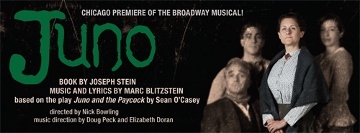MELTING JIGS INTO DIRGES
Whether it’s a Jewish family in Awake and Sing! or a black one in A Raisin in the Sun, poverty grinds down its unloved ones and prejudice finishes the kill. As steeped in the details of deprivation as the later Irish clan in Angela’s Ashes, Sean O’Casey’s 1922 masterpiece uses the Irish Civil War (which killed more Irishmen than the British “Black and Tans” ever could) as a backdrop for a tale packed with tears and laughs, whiskey and wisdom. Spun off as a musical 37 years later, with book by Joseph Stein and music and lyrics by Marc (The Cradle Will Rock) Blitzstein, Juno opened in 1959 to unfavorable reviews and closed early.
Subsequent revivals have met a kinder reception. Judging from Nick Bowling’s pile-driving staging, TimeLine Theatre Company’s spring and summer-long revival is a good bet on an old horse.
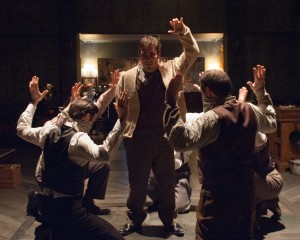 At its best, this 140-minute romp/slump sticks to its source, interweaving high spirits (a party with a new gramophone, boozing anthems at the local pub) and dark luck (unwanted pregnancy, a treacherous bequest, relentless creditors, a murder by the IRA, eventual eviction). The play’s immense capacity to enrage and depress remains intact. It’s almost as easy to imagine a riot breaking out today over Juno and the Paycock as it did 88 years ago. O’Casey relentlessly exposes in his fellow Irishmen (emphasis on “men”) truths that for all their universality are wickedly targeted: Their penchant for phony sentiment and religious rigidity; the lazy love of bluster and beer; and the wasteful preference of the martyred dead over the needy living. Appropriately, the ebullient anthem “We’re Alive” opens the show with euphoria and closes it with regret.
At its best, this 140-minute romp/slump sticks to its source, interweaving high spirits (a party with a new gramophone, boozing anthems at the local pub) and dark luck (unwanted pregnancy, a treacherous bequest, relentless creditors, a murder by the IRA, eventual eviction). The play’s immense capacity to enrage and depress remains intact. It’s almost as easy to imagine a riot breaking out today over Juno and the Paycock as it did 88 years ago. O’Casey relentlessly exposes in his fellow Irishmen (emphasis on “men”) truths that for all their universality are wickedly targeted: Their penchant for phony sentiment and religious rigidity; the lazy love of bluster and beer; and the wasteful preference of the martyred dead over the needy living. Appropriately, the ebullient anthem “We’re Alive” opens the show with euphoria and closes it with regret.
Originally three hours, O’Casey’s tragicomedy has a range that an opera would envy’”an array which TimeLine’s musical is tasked to equal. With its promise of sudden wealth the second act veers from raucous comedy to trenchant suffering to acidic satire, each shift exactly right whether or not you can fathom why. Even with 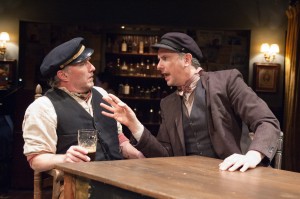 sweetening from the songs, Juno is a series of shocks: Fate relentlessly pounds the Boyle family.
sweetening from the songs, Juno is a series of shocks: Fate relentlessly pounds the Boyle family.
These poor Dubliners infest a shabby-genteel tenement during the singularly stupid time of troubles: the Irish Civil War, when murderous fanatics believed, as now, that “No one can do enough for Ireland.” Proudly ignorant, unemployed and in debt, and anesthetized by booze to his fallen glory, the slacker father Captain Jack Boyle (raucous Ron Rains)’”called the “Paycock” for his vainglory’”grandiloquently moans over his aching legs as he drinks his way to the last farthing.
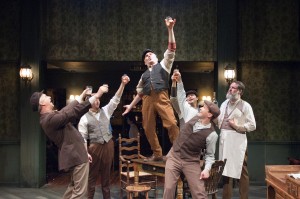 A freeloading opportunist, Jack’s craven, treacherous pal Joxer Daly (James Houton as a tipsy turncoat) sponges off his friend and steals his spoons. Jack’s bitter, ghost-like son Johnny (Jonnie Stein), still clinging to his alleged republican “principles,” has lost an arm to the Civil War (during the never-forgotten, often avenged 1916 Easter Riot at the Dublin Post Office on O’Connell Street). Now, after this near-martyrdom, Johnny finds himself fingered by the “Irregulars” as an informer. It’s easy to imagine counterparts for these men in Ulster, the Ukraine, Serbia, Rwanda, Syria–and Chicago.
A freeloading opportunist, Jack’s craven, treacherous pal Joxer Daly (James Houton as a tipsy turncoat) sponges off his friend and steals his spoons. Jack’s bitter, ghost-like son Johnny (Jonnie Stein), still clinging to his alleged republican “principles,” has lost an arm to the Civil War (during the never-forgotten, often avenged 1916 Easter Riot at the Dublin Post Office on O’Connell Street). Now, after this near-martyrdom, Johnny finds himself fingered by the “Irregulars” as an informer. It’s easy to imagine counterparts for these men in Ulster, the Ukraine, Serbia, Rwanda, Syria–and Chicago.
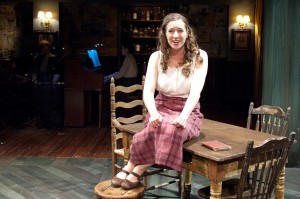 If O’Casey didn’t balance the defamation against so much compassion mixed with gallows humor, both play and musical would be too bleak to take. He lavishes it, however, entirely on the women. Jack’s daughter Mary (winsome Emily Glick) still hopes for a better life (“I Wish It So” and “For Love”), perhaps with Charles Bentham (Peter Oyloe as a suitably bland Englishman), the young lawyer who brings her family news of a bequest. Much to the consternation of Mary’s homegrown boyfriend Jerry Devine (forlorn Jordan Brown), who just craves “One Kind Word,” Charles also brings for Mary a first chance at love (“My True Heart”).
If O’Casey didn’t balance the defamation against so much compassion mixed with gallows humor, both play and musical would be too bleak to take. He lavishes it, however, entirely on the women. Jack’s daughter Mary (winsome Emily Glick) still hopes for a better life (“I Wish It So” and “For Love”), perhaps with Charles Bentham (Peter Oyloe as a suitably bland Englishman), the young lawyer who brings her family news of a bequest. Much to the consternation of Mary’s homegrown boyfriend Jerry Devine (forlorn Jordan Brown), who just craves “One Kind Word,” Charles also brings for Mary a first chance at love (“My True Heart”).
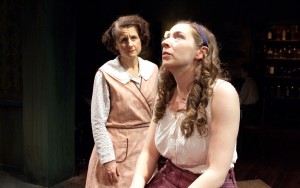 A Gaelic “Mother Courage,” the powerhouse of the family–delivered by O’Casey in a portrait as indelible as any by John Steinbeck or Lorraine Hansberry–is Juno Boyle (anguished and aspiring Marya Grandy). A long-suffering and tough-loving mother, she rages against the daily diminishment that impoverishment brings. Juno is the play’s heart, the one force great enough to balance the bad luck. Her “Song of the Ma” is a laundry list of life’s cascading crises. Her “Where?,” harrowingly rendered by a lacerative Grandy, is a mother’s indictment of a fate beyond knowing but not beyond bearing. At times she almost turns this domestic tragedy a bit Greek.
A Gaelic “Mother Courage,” the powerhouse of the family–delivered by O’Casey in a portrait as indelible as any by John Steinbeck or Lorraine Hansberry–is Juno Boyle (anguished and aspiring Marya Grandy). A long-suffering and tough-loving mother, she rages against the daily diminishment that impoverishment brings. Juno is the play’s heart, the one force great enough to balance the bad luck. Her “Song of the Ma” is a laundry list of life’s cascading crises. Her “Where?,” harrowingly rendered by a lacerative Grandy, is a mother’s indictment of a fate beyond knowing but not beyond bearing. At times she almost turns this domestic tragedy a bit Greek.
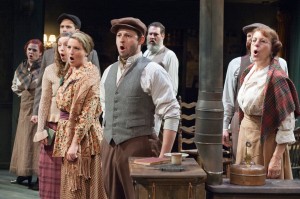 Blitzstein counters the Boyles’ declining fortunes with rollicking upbeat rousers like the wonderful musical party (“Music in the House,” “It’s Not Irish” and “The Liffey Waltz”); wonderfully choreographed by Katie Spelman, it’s this family’s last big fling. The sweet duet “Old Sayin’s” between Juno and the Captain suggests the coy courtship that’s now declined into acrimony. In the wonderfully harmonized “Bird Upon the Tree,” tenderly crooned by mother and daughter, Blitzstein pays homage to Irish folk songs and sentimental blarney. In “Poor Thing” four neighboring gossips (Caron Buinis, Kelli Harrington, Anne Sheridan Smith, and Kathleen Gibson) host a pity party to see who among them suffers most. There’s even a dream ballet that depicts son Johnny’s justified fears of the encroaching IRA.
Blitzstein counters the Boyles’ declining fortunes with rollicking upbeat rousers like the wonderful musical party (“Music in the House,” “It’s Not Irish” and “The Liffey Waltz”); wonderfully choreographed by Katie Spelman, it’s this family’s last big fling. The sweet duet “Old Sayin’s” between Juno and the Captain suggests the coy courtship that’s now declined into acrimony. In the wonderfully harmonized “Bird Upon the Tree,” tenderly crooned by mother and daughter, Blitzstein pays homage to Irish folk songs and sentimental blarney. In “Poor Thing” four neighboring gossips (Caron Buinis, Kelli Harrington, Anne Sheridan Smith, and Kathleen Gibson) host a pity party to see who among them suffers most. There’s even a dream ballet that depicts son Johnny’s justified fears of the encroaching IRA.
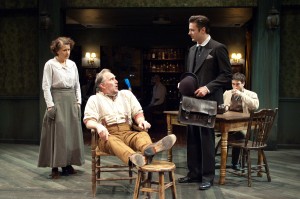 Though ultimately a determined downer replete with now-sturdy stereotypes, Juno somehow succeeds as a communal chronicle. Carried off with sheer showbiz energy, it exuberantly confirms O’Casey’s tested faith in the resilience and spunk of his self-sacrificing homeland.
Though ultimately a determined downer replete with now-sturdy stereotypes, Juno somehow succeeds as a communal chronicle. Carried off with sheer showbiz energy, it exuberantly confirms O’Casey’s tested faith in the resilience and spunk of his self-sacrificing homeland.
photos by Lara Goetsch
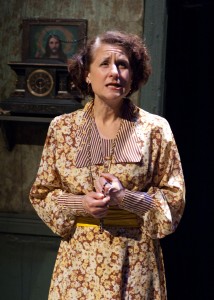 Juno
Juno
TimeLine Theatre Company
615 W. Wellington Ave.
Wed and Thurs at 7:30 pm, Fri at 8 pm,
Sat at 4 pm and 8 pm, Sun at 2 pm
scheduled to end on July 27, 2014
for tickets call 773-281-8463
or visit www.timelinetheatre.com
for info on this and other Chicago Theater,
visit www.TheatreinChicago.com
